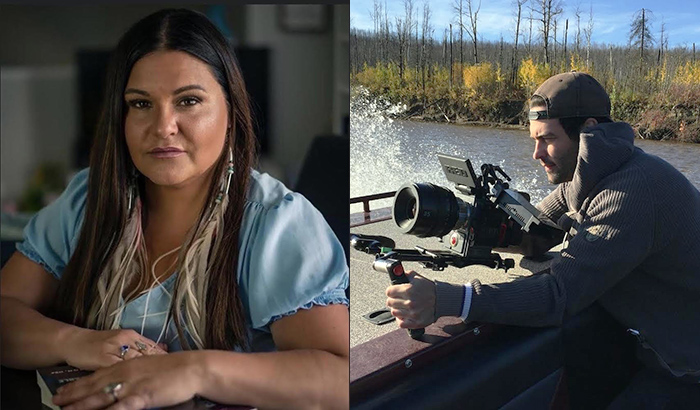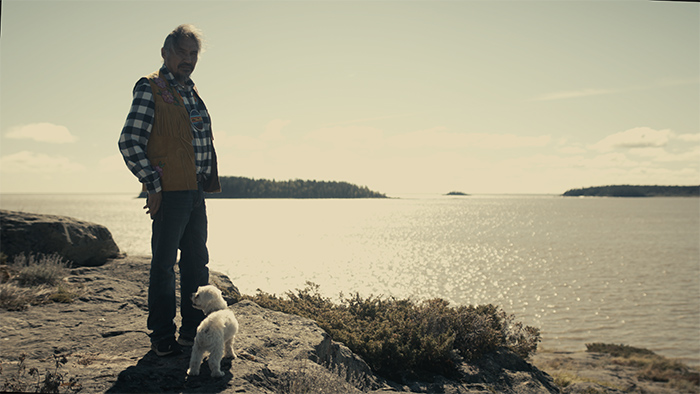2024 Canadian Hillman Prize Winner

Brandi Morin: Co-Director, Producer, Writer
Geordie Day: Co-Director, Producer, Cinematographer, Editor
With editors and producers: Andrea Houston and Ethan Cox, Ricochet Media; Cara McKenna and Eden Fineday, IndigiNews; Maximilian Alvarez, Kayla Rivara and Rosette Sewali, Real News Network
Most Canadians who reap the benefits of the oil sands industry in Alberta turn a blind eye to the damage it causes.
Killer Water is a story of greed, corruption, and willful government neglect. Journalist Brandi Morin and cinematographer Geordie Day expose the realities of an industry that is creating environmental refugees in Canada. Their investigation compels politicians and industry leaders to confront the toxic impact of the oil sands industry.
Morin and Day invested months of investigative reporting and filmed in a remote First Nation community accessible only by boat or plane. Journalists and editors from Ricochet Media teamed up with The Real News Network based in the U.S., and IndigiNews Media in Canada (an Indigenous women-led outlet), pooling limited resources and working together in an international cross-border collaboration.

The Athabasca is Alberta’s longest river and is designated as a Canadian Heritage River. The Athabasca boreal forest sits on the largest known reservoir of crude bitumen on the planet, which is exploited by the oil sands industry. It employs 138,000 people and produces about 3.3 million barrels of oil a day, an important driver of the economy for both Alberta and the country.
Meanwhile, Indigenous people who live downstream struggle to deal with the environmental fallout. The lifeblood of their community is polluted, the fish are deformed, and people are experiencing heightened rates of both rare and common cancers, including in their children.
According to environmental toxicologist Mandy Olsgard, once the government approves an oil sands project, no regulatory body is responsible for community or human health, or tests for known toxic chemicals.
In Killer Water, Athabasca Chipewyan First Nation Chief Allan Adam explains that his community is facing the detrimental impact of toxic tailings and leaks on the delicate ecosystems, water sources, and human life in and around Fort Chipewyan.
Last February, Indigenous communities downstream from Imperial Oil’s Kearl Mine learned of a massive spill from its tailings area. The water released in that spill exceeded federal and provincial guidelines for arsenic, sulphates, and hydrocarbons. Even though it was one of the largest releases of tailings in Alberta’s history, the provincial government failed to inform the community until there was a second incident. That’s when the Alberta Energy Regulator (AER) issued an Environmental Protection Order, triggering an “emergency” response, and calling on the company to contain and remediate the spill.
Another long-term spill had happened at the same mine about nine months earlier. Mine employees discovered the leak, and notified Imperial Oil, which in turn alerted the AER. However, no one informed the affected Indigenous communities, the public, or provincial, territorial, and federal governments.
The delay in issuing an alert has spurred the Athabasca Chipewyan First Nation to sue the Alberta Energy Regulator. Filed on March 5th, 2024, the lawsuit calls for financial damages of $500 million for “negligence, breach of duty to consult and treaty infringement,” and it seeks systemic reform.
On January 10, 2024, Brandi Morin was reporting on a police raid of an Indigenous encampment in Edmonton, Alberta. Officers arrested her and charged her with obstruction. Several weeks later, the charges were dropped.
Killer Water has been critical to the effort to mitigate the detrimental effects of oil sands pollution. First Nations communities have shared it widely, and have used it to compel politicians and industry leaders to take their concerns seriously.
Brandi Morin is an award-winning Cree/Iroquois/French journalist from Treaty 6 territory in Alberta. For the last 10 years, Morin has specialized in sharing Indigenous stories, some of which helped spark change and reconciliation in Canada’s political, cultural, and social landscapes. Morin is known for her clear-eyed and empathetic reporting on Indigenous oppression in North America. She is herself a survivor of the missing and murdered Indigenous women and girls crisis, and uses her experience to tell the stories of those who did not survive the rampant violence.
Morin won a Human Rights Reporting award from the Canadian Association of Journalists in April 2019 for her work with the CBC’s Beyond 94 project, tracking the progress of the Truth and Reconciliation Commission’s Calls to Action. In July 2022, Morin won Best Feature Story at the Native American Journalists Association for “‘Canada’s ‘crying shame:’ The fields full of children’s bones” with Al Jazeera English, as well as Best Column for her essays with the Toronto Star. Morin’s series about the genocide of missing and murdered Indigenous women and girls with Al Jazeera English won a top prize in the Feature Reporting category of the 2022 Edward R. Murrow Awards. In September 2023, PEN Canada awarded Morin with its annual Ken Filkow Prize for advancing freedom of expression in Canada, and Amnesty International Canada named Morin the 2022/23 Media Award winner in the Local News/Alternative category for her story “The last of the untamed: Wedzin Kwa and the Wet’suwet’en fight to save her,” which chronicled the Wet’su’wet’en People’s battle to stop a pipeline from being constructed through their unceded lands. Her debut memoir Our Voice of Fire: A Memoir of a Warrior Rising became a national bestseller. Morin has been described as a “force” and a human rights champion who relentlessly persists in reporting with courage and transparency.
Geordie Day is a documentary filmmaker and television producer/director. His films have been showcased on television, on-demand services, and in theatres around the world. Day has produced, written, and directed factual programming for Amazon Prime, Cooking Channel, Animal Planet, Nat Geo, CBC, CTV, E!, MTV, CMT, REELZ, MGM+, and Crave. His directing credits include 21 episodes of the true crime show The Shocking Truth, and 33 episodes of Sex, Lies, and Murder.
In 2017, Day produced Charles Manson: Final Words, including the last recorded interviews with Manson. Narrated by musician Rob Zombie, the film aired on REELZ and was featured on TMZ, Megan Kelly Live, Rolling Stone Magazine, Billboard Magazine, and The New York Times. In 2019, Day wrote, directed, and produced Tough Guy: The Bob Probert Story, an intimate portrait of the legendary NHL enforcer. The film was released in theatres across the U.S., and is currently streaming on Amazon Prime. In 2022, Day served as director of photography and story producer on Ayoungman. The film was featured at the San Francisco International Film Festival, Calgary International Film Festival, Dreamspeakers, and the AmDocs Film Festival in Palm Springs, where it won Best Documentary.
In 2023, Day co-directed Killer Water and Thacker Pass: Mining the Sacred, in partnership with The Real News, Ricochet Media, and IndigiNews.

